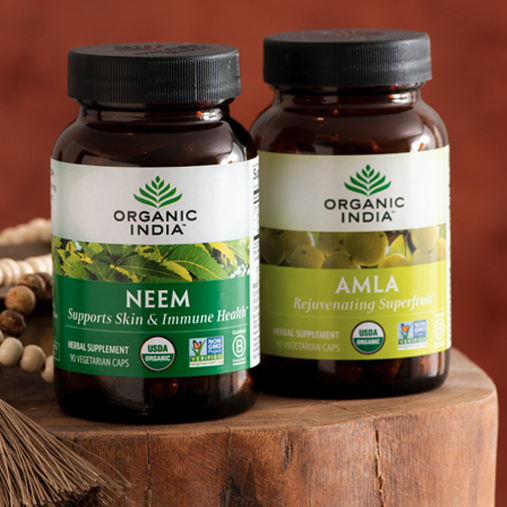Back
By Vic Shayne, Author: Consciousness: The Potentiality of All Existence
Digestion is the foundation of all health, simply because it is the first function of the body that relates to all other functions. Eating is both a biological and a sacred act, in which life is sacrificed in order to perpetuate life. In this system of eating, digestion, and metabolizing we either create health or disease, depending on our food choices, the herbs we consume, our state of mind and spirit, and the function of the digestive system. This is why it’s important to understand the link between food, digestion and gut health as a way to find overall wellness.
Upanishads on “Food Bodies”
The Upanishads teach that we are all “food bodies.” This philosophy regarding food bodies is simple yet hardly recognized in our modern society. It states that life feeds on life, and that is the natural cycle keeping nature in balance, sustaining and perpetuating all of existence as we know it here on our delicate planet. In addition, it means that the body is a biological organism, but we are all something else, spiritually speaking. It is consciousness that is able to recognize and appreciate the marvel of the digestion process.
Our bodies are an integral part of the beautiful intelligence of nature, but when we eat substances that are unnatural, the digestive system is compromised in various ways.
Our bodies, which are food bodies, are meant only to consume other food bodies. This ancient wisdom from the Upanishads holds the key to all life and health. The sage Nisargadatta Maharaj explained, “Is not the body made of food? And can there be a mind without food?… Just like the wood produces fire which is not wood, so does the body produce the mind which is not the body. But to whom does the mind appear? Who is the perceiver of the thoughts and feelings which you call the mind? There is wood, there is fire and there is the enjoyer of the fire. Who enjoys the mind? Is the enjoyer also a result of food, or is it independent?”
Our bodies are an integral part of the beautiful intelligence of nature, but when we eat substances that are unnatural (processed foods, refined sugars, altered fats, junk food, and so on), then the digestive system is compromised in various ways. Everything that we eat affects the mind, body, emotions and spirit; it can be no other way.
Digestion in Ayurveda
Practitioners at the Alandi Ayurveda Clinic explain that Agni is the driving force for longevity, complexion, strength, health, enthusiasm, muscle-mass, luster, immunity, energy, and more. Agni is at the root cause of all. Ayurveda refers to digestion as a sacred fire that is personified in as the Vedic fire god of Hinduism. This fire in the belly consumes food and fashions it into the elements of the body, mind, and spirit.
Ayurvedic practitioner Suhas Kshirsagar explained that “a healthy digestive system is revered in Ayurveda as a cornerstone of wellbeing, and every disease is believed to arise from inefficient digestion.” The science of Ayurveda can be distilled into the singular idea that “total health resides in the state of our digestive powers, and that restoring health must originate with a focus on our digestive system. Your digestive fire simply refers to your body’s metabolism—the process of turning nutrients from food into energy for cells to sustain life, which of course is commandeered by your digestion, a complex combination of biological and chemical interactions.”
While many people turn to digestive enzymes for gut issues, Ayurvedic experts explain that it is more effective and helpful to strengthen Agni. There are three main ways to achieve this: remove the cause of digestive weakness, improve the diet, and use herbs and other natural remedies.
Digestion and Gut Health
Digestion and gut health are inextricably linked. Digestion starts the moment you put food in your mouth because saliva contains a carbohydrate-splitting enzyme called ptyalin that prepares food for the stomach. Beyond this stage, to optimize good digestion, you need to consider what constitutes a healthy gut (gastrointestinal tract). The gut is the key to digestive health because it is where food is processed by the body, from the time it is swallowed and becomes absorbed by the body for multiple uses and biochemical processes.
Ultimately, gut health relies on good bacteria. Harvard researchers have reported that bacteria not only helps digest food, but may also prevent many digestive disorders and treat many common diseases. About 100 trillion bacteria, both good and bad, live inside the digestive system. Collectively, they are called the gut microbiota. Elizabeth Hohmann, MD, of the infectious diseases division at Massachusetts General Hospital, said that researchers are continuing to perceive gut microbiota as “an additional organ system.” She said that it’s most important to the health of the digestive tract, and may have even more far-reaching effects on overall well-being.
Eating foods that promote healthy gut bacteria may help you to avoid symptoms associated with irritable bowel syndrome, constipation, indigestion, and other digestive disorders. “Anything that can feed good bacteria and keep them plentiful is good for overall health. When the gut is happy, you are happy,” said Hohman.
Psyllium For a Healthy Gut
Psyllium is a form of fiber made from the husks of Plantago ovata seeds. Research shows that consuming psyllium is beneficial to many parts of the human body, including the heart and pancreas. Psyllium has been recognized as a well-known prebiotic — a substance that promotes healthy colonies of probiotics to grow in the gut. Probiotics are microorganisms that constitute the good bacteria that are required in the digestive tract. They support the gut from within by optimizing digestion and improving nutrient absorption in the stomach.
Medical science has shown that a healthy colony of good bacteria is the prerequisite for a healthy immune system, as well enabling the body to fight infection, reducing inflammation, and maintaining healthy tissue and cells. Learn more about psyllium pre & probiotic fiber and their benefits here.
Doshas, Digestion and Gut Health
According to Ayurvedic philosophy, not only should we eat foods that are natural and health-promoting, but we should also eat foods that support our dosha. There are three doshas — Vata, Pitta, and Kapha — all of which are produced out of the basic building blocks of life, which are the five elements of earth, water, fire, air, and ether. One of the three doshas predominates and determines each person’s constitution that incorporates mind, body, emotions, and spirit. An Ayurvedic practitioner is able to determine when one’s dosha is out of balance and can thereby suggest certain foods, herbs, and practices that work to restore it.
Mindful Eating
Eating for mind, body, and spirit is one of many ways to improve digestion and gut health, while avoiding symptoms of bloating or inflammation. Start by consuming a high-fiber diet that consists of healthy fats and nutrients. Try to eliminate foods from your diet that may cause acid reflux or constipation. Eating for health is a mindset. It is a way of seeing food as the essence of the body and as part of the great picture of consciousness in which all expressions — people, animals, plants, and even objects — consume foods and become food for others. When the foods you eat become sacred to you, then the body, mind, and spirit may come into balance.
Ripa Ajmera, the founder of Whole Yoga & Ayurveda, wrote, “One of the most powerful lessons from the ancient science of Ayurveda for me has been to see my body as my temple … As we learn to perceive and treat our bodies as our temples, we are able to not only respect ourselves more, but also to honor one another as living embodiments of divinity.
“Ayurveda, as an ancient art of living, teaches us to take care of our bodies and minds so that we can achieve oneness with the higher being residing within, and connect with that without, as well. That is why Indians greet one another by saying ‘Namaste’: The higher being in me bows to that higher being in you. Honoring others begins with honoring ourselves, as there really is no ‘other’ – we meet none but ourselves in one ‘another.’”















